Indo-German Symposium - Future of Work 2019
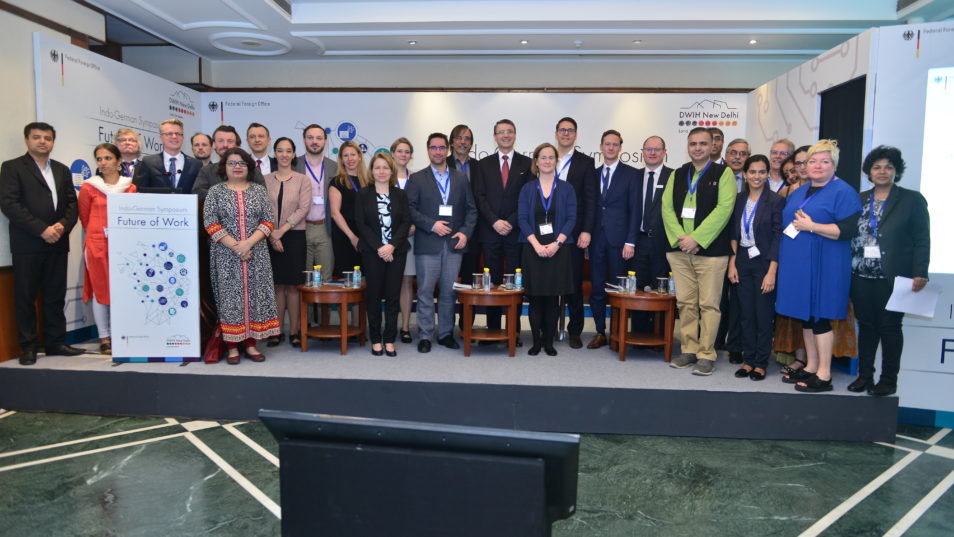 © DWIH New Delhi
© DWIH New Delhi
Event Information
March 19 to 20, 2019
New Delhi
Organizer(s): DWIH - German Centre for Research and Innovation New Delhi
Driven by technological developments, but also by social, economic and cultural shifts, the world of work is evolving. Gradually moving towards an era where man and machine shall co-work by deploying technologies such as Artificial Intelligence, big data, robotics, IoT at the site of work and otherwise, the challenge of the future will be to extract the best out of this co-working relationship. Human societies have little choice but to brace themselves for the changes to come and find intelligent ways of managing and steering them.
One of the sites of massive change will be the labour market. Less complex and routine tasks are widely expected to be increasingly automated. At the same time, however, tasks which are complex, creative and demand analytical skill will rise in significance. The challenge will be to achieve an inclusive future of work in which everyone finds their place. On the one hand, this calls for massive efforts at up-skilling and re-skilling through innovative forms of training delivery and new kinds of job discovery for all section of the work force. On the other hand, it will be a matter of prime significance to ensure that those excluded from the opportunities will find support and justice.
As the labour markets change, so will the workplaces and working environments of the future. Reorganized structures of working and technological tools such as teleconferencing, remote-working etc. have the potential of empowering individuals and of unleashing creative energies. However, they may also have adverse psychological and social effects. An important challenge of the future will be to find equitable, healthy and safe ways of developing work spaces.
Shifting trends towards increasing dependency on technology and automation will have tangible and intangible effects on business, economy, society and on individuals. In order, to help us understand them, we need to reject facile generalizations, but must look at the complex realities and consider topics from migration via data-privacy and security to social equality.
With an aim to encourage an exchange of views, to deepen our understanding of the issues and to start deliberating on possible responses to the changing world of work, the DWIH symposium “Future of Work” brough together eminent Indian and German academicians, scientists, researchers, policymakers, representatives of international organisations. The event was structured around five broad themes.
Speakers
Day 1- Wednesday, 19th March 2019
Dr A. Didar Singh
Senior Fellow, Delhi Policy Group
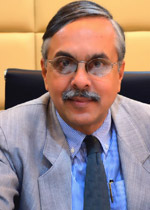 Dr A. Didar Singh, member of the ILOs ‘Global Commission on the Future of Work’, is an author and civil servant who served as Secretary to Government of India from 2009 to 2011 and as Secretary General, FICCI (Federation of Indian Chambers of Commerce and Industry) from 2012 to 2017. Dr. Singh is presently Senior Fellow, Delhi Policy Group and Adviser Bridge India, London. He also functions as Chair of the Diaspora group of KNOMAD, World Bank. He holds a PhD on the Policy and Administration of E-commerce from Panjab University, Chandigarh and is also an alumnus of St. Stephen’s College, Delhi, and the University of Birmingham, UK.
Dr A. Didar Singh, member of the ILOs ‘Global Commission on the Future of Work’, is an author and civil servant who served as Secretary to Government of India from 2009 to 2011 and as Secretary General, FICCI (Federation of Indian Chambers of Commerce and Industry) from 2012 to 2017. Dr. Singh is presently Senior Fellow, Delhi Policy Group and Adviser Bridge India, London. He also functions as Chair of the Diaspora group of KNOMAD, World Bank. He holds a PhD on the Policy and Administration of E-commerce from Panjab University, Chandigarh and is also an alumnus of St. Stephen’s College, Delhi, and the University of Birmingham, UK.
More information at: http://www.delhipolicygroup.org/faculty/dr-a-didar-singh.html
Dr. Thomas Lange
Head, Programme Area Economics, Education and Employment, acatech – National Academy of Science and Engineering (Germany)
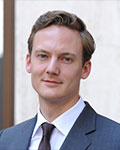 Acatech provides top-level expertise from science and business for political decision-making processes based on a double mandate from the federal as well as the regional governments in Germany. Dr. Lange has more than eight years of experience with a wide range of projects on innovation policy and committees of experts. He also lectures on political consulting at the University of Freiburg.
Acatech provides top-level expertise from science and business for political decision-making processes based on a double mandate from the federal as well as the regional governments in Germany. Dr. Lange has more than eight years of experience with a wide range of projects on innovation policy and committees of experts. He also lectures on political consulting at the University of Freiburg.
Before joining acatech, he worked as a Junior Economist at ifo Institute for Economic Research in Munich and as a Research Associate at the University of Konstanz. He was also a Visiting Scholar at Queen’s University in Kingston/Ontario, Canada.
Thomas earned a Master of Science in Economics and a doctorate in Economics from the University of Konstanz.
More information at: https://en.acatech.de/
Prof. Dr. Gregor Engels
Chair, Database and Information Systems, Paderborn University
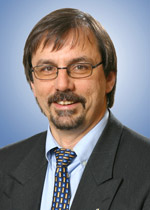 Prof. Dr. Gregor Engels received his PhD in Computer Science in 1986 from the University of Osnabrück, Germany. Between 1991 and 1997 he held the position of Chair of Software Engineering and Information Systems at the University of Leiden, The Netherlands.
Prof. Dr. Gregor Engels received his PhD in Computer Science in 1986 from the University of Osnabrück, Germany. Between 1991 and 1997 he held the position of Chair of Software Engineering and Information Systems at the University of Leiden, The Netherlands.
Since 1997, he is Professor of Informatics at Paderborn University, Germany.
He is chairperson of the Software Innovation Lab; the university part of the technology transfer institute Software Innovation Campus Paderborn (SICP). He is chair of two interdisciplinary graduate schools on the topics “Design of flexible working environments- human-centred use of Cyber-Physical Systems in industry 4.0”, and “Digital Future”, where around 20 PhD students from different disciplines research on the impact of digital transformations on working environments. He is board member of Informatics Europe, a European organization representing informatics departments from universities all over Europe.
Since 1997, he is Professor of Informatics at Paderborn University, Germany.
More information at: https://bit.ly/2BwERXV
Dr. Moritz Hämmerle
Managing Director, Fraunhofer Institute for Industrial Engineering IAO
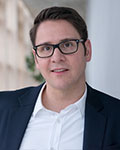 Dr. Moritz Hämmerle is the head of the research department “Cognitive Engineering and Production” at Fraunhofer Institute for Industrial Engineering IAO. Since 2008, he and his teams have been researching and consulting innovative companies on issues relating to digitized production, industry 4.0 and the future of production work. His focus is on production assessment 4.0, I4.0 and lean production, smart flexibilization of working hours in the factory and integration of employees into digital transformation. He is a member of the winning team of the German Industry 4.0 Award 2014 and has, since 2017, been setting up the Future Work Lab in Stuttgart, the largest German innovation laboratory for work, people and technology.
Dr. Moritz Hämmerle is the head of the research department “Cognitive Engineering and Production” at Fraunhofer Institute for Industrial Engineering IAO. Since 2008, he and his teams have been researching and consulting innovative companies on issues relating to digitized production, industry 4.0 and the future of production work. His focus is on production assessment 4.0, I4.0 and lean production, smart flexibilization of working hours in the factory and integration of employees into digital transformation. He is a member of the winning team of the German Industry 4.0 Award 2014 and has, since 2017, been setting up the Future Work Lab in Stuttgart, the largest German innovation laboratory for work, people and technology.
More information at: https://www.iao.fraunhofer.de/lang-en/
Mr. Volker Schmid
Head, Asia/Pacific, Festo Didactic SE
 Mr. Volker Schmid, having a graduate engineering degree in Mechatronics and Automation Engineering from Esslingen University, Germany, with post graduate studies and living experiences in Singapore and Asia during the past twenty years plus, is currently holding the position of the Head of Asia and Pacific for the company of Festo Didactic SE, being the educational arm of Festo.
Mr. Volker Schmid, having a graduate engineering degree in Mechatronics and Automation Engineering from Esslingen University, Germany, with post graduate studies and living experiences in Singapore and Asia during the past twenty years plus, is currently holding the position of the Head of Asia and Pacific for the company of Festo Didactic SE, being the educational arm of Festo.
During the past fifteen years, Mr. Schmid has been developing the educational market for Festo Didactic in Asia, Middle East and some parts of Africa, supported by various publications in the fields of curricula design, holistic approaches of training and excellence centres as well as others.
Christos Chantzaras
TUM Department of Architecture – Innovation Network & Architect Research Incubator
 Christos Chantzaras has a 10-year-experience as architect and consultant for large scale national and international projects. Since 2007 he held different positions as project manager and project director. He was responsible for office, R&D and production buildings as well as consulting projects within various industries. From 2015 to 2017 he set up an architectural branch in Berlin as interdisciplinary strategy team. End of 2016, he started as lecturer at TUM Department for Architecture to open the profession towards fields ahead of building design. Since March 2017 he is research associate with focus on architectural entrepreneurship and how thinking of architecture can be applied to innovation processes and new ways of working. Related to this, Christos is setting up an Architecture Research Incubator (ARI), developing new educational formats in architecture and mentoring start-ups on the future of work.
Christos Chantzaras has a 10-year-experience as architect and consultant for large scale national and international projects. Since 2007 he held different positions as project manager and project director. He was responsible for office, R&D and production buildings as well as consulting projects within various industries. From 2015 to 2017 he set up an architectural branch in Berlin as interdisciplinary strategy team. End of 2016, he started as lecturer at TUM Department for Architecture to open the profession towards fields ahead of building design. Since March 2017 he is research associate with focus on architectural entrepreneurship and how thinking of architecture can be applied to innovation processes and new ways of working. Related to this, Christos is setting up an Architecture Research Incubator (ARI), developing new educational formats in architecture and mentoring start-ups on the future of work.
More information at: https://www.en.gender.soziologie.uni-muenchen.de/index.html
Dr. Gaurav Raheja
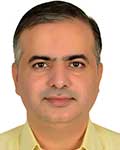 Dr. Gaurav Raheja is an architect with social thinking outlooks and a well-known expert of accessibility and universal design from India. In addition to serving as Associate Professor, he is also Co-Cordinator of Design Innovation Center at IIT Roorkee.
Dr. Gaurav Raheja is an architect with social thinking outlooks and a well-known expert of accessibility and universal design from India. In addition to serving as Associate Professor, he is also Co-Cordinator of Design Innovation Center at IIT Roorkee.
Dr. Raheja has been an expert member and has played key advisory roles to the Department of Disabilities in Ministry of Social Justice and Empowerment, Govt. of India for Accessible India Campaign, 2015 and conceptualization of National Institute of Universal Design. He is one of the co-authors of Universal Design India Principles, copyrighted and released in 2011.
During 2015-17, he was invited as an accessibility consultant to conduct access audits of some prestigious projects including the Prime Minister’s Office and mobility hubs like New Delhi Railway Station, New Delhi International Airport, etc. He was awarded the Mphasis Universal Design Award, 2010 for his professional and research contributions in the field of universal design. He received the Guest Research Fellowship at T U Berlin in 2017, DAAD IIT Faculty Exchange Fellowship 2016 and DAAD Science Tour Fellowship 2016 amongst few others.
He has been developing collaborations in domains of accessibility, urban futures and urban mobility with German universities like T U Darmstadt, T U Berlin, and T U Dresden among others.
With a vision of researching urban futures of human inclusion in built and mobility environments, he has set up Laboratory of Inclusive Design at the Department of Architecture & Planning, IIT Roorkee. Dr. Raheja has delivered several invited talks at national and international platforms including DLR, Berlin, WHO, New Delhi, IIM Ahmedabad, TISS Mumbai, Accenture, Bangalore and several others. He has guided 03 PhDs and 16 Masters dissertations in varied domains of architecture and transportation.
Dr. Raheja has recently been appointed as the DAAD Research Ambassador from India.
More information at: https://www.iitr.ac.in/departments/AR/pages/People+Faculty+grdesfap.html
Sangeeta Ray
Vice President – Siemens Real Estate – Asset Management Unit India & Bangladesh
Siemens Ltd.
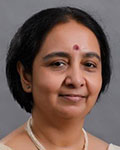 Ms. Sangeeta Ray has been serving as the Head of Real Estate- India and Bangladesh for Siemens Ltd. since 2012. Before this, she was designated as the General Manager for Real Estate Strategy and Planning for South Asia. Though a Chartered Accountant by qualification, her strengths lie primarily in general management, controlling and process orientation. She played an instrumental role in the acquisition of Metrix by Siemens Building Technologies India group during 2007-09 as the executive head for Finance for the company. She has over 27 years of professional experience in diverse management areas, including HR, Finance and Accounts, Audit and Corporate Strategy. She recently (in 2016) also completed her Executive MBA from ISB, Hyderabad which also gave her a chance to complete short programs from FDC in Brazil and at Kellogg & Wharton in the US.
Ms. Sangeeta Ray has been serving as the Head of Real Estate- India and Bangladesh for Siemens Ltd. since 2012. Before this, she was designated as the General Manager for Real Estate Strategy and Planning for South Asia. Though a Chartered Accountant by qualification, her strengths lie primarily in general management, controlling and process orientation. She played an instrumental role in the acquisition of Metrix by Siemens Building Technologies India group during 2007-09 as the executive head for Finance for the company. She has over 27 years of professional experience in diverse management areas, including HR, Finance and Accounts, Audit and Corporate Strategy. She recently (in 2016) also completed her Executive MBA from ISB, Hyderabad which also gave her a chance to complete short programs from FDC in Brazil and at Kellogg & Wharton in the US.
Day 2- Thursday, 20th March 2019
Prof. Dr. Sabrina Schneider
Assistant Professor for Technology Management, University of Kassel, Germany
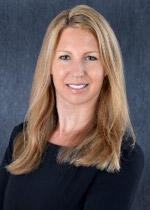 Prof. Dr. Sabrina Schneider holds a PhD from EBS University for Business and Law, Germany. Her research centres on the strategic implications of digital technologies on business and society. She leads the research group, the Department of Managerial Technology Management, founded in Oct 2016. The research group is part of the Institute of Management and Business Studies (IBWL) of FB 07 (Faculty of Economics and Management) Its main emphasis lies on providing teaching on technology management, business model innovation and management of digitization and to conduct research on the management of disruptive technological developments, in particular digitization.
Prof. Dr. Sabrina Schneider holds a PhD from EBS University for Business and Law, Germany. Her research centres on the strategic implications of digital technologies on business and society. She leads the research group, the Department of Managerial Technology Management, founded in Oct 2016. The research group is part of the Institute of Management and Business Studies (IBWL) of FB 07 (Faculty of Economics and Management) Its main emphasis lies on providing teaching on technology management, business model innovation and management of digitization and to conduct research on the management of disruptive technological developments, in particular digitization.
More information at: https://bit.ly/2BwERXV
Prof. Dr.-Ing. Barbara Deml
Director, Institute of Human and Industrial Engineering (IFAB)
Karlsruhe Institute of Technology
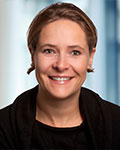 Prof. Barbara Deml studied psychology and speech communication at the University of Regensburg, Germany. In her doctoral studies she did research in the field of tele-robotics and telepresence with a major concern on the design of haptic human machine interaction. Her dissertation thesis in doctoral engineering was honoured with a research award by the University of the Armed Forces, Germany. After postdoctoral studies at TU München and Carnegie Mellon University (Pittsburgh, PA) she joined the University of the Armed Forces as Assistant Professor for Cognitive Ergonomics. In 2009 she became a Full Professor at Otto-von-Guericke-Universität Magdeburg and in 2012 she joined Karlsruhe Institute of Technology (KIT). Since this time, Prof. Deml is director of the Institute of Human and Industrial Engineering. Her major research focus is on the design of human-robot-interfaces, user state and intention prediction as well as on the impact of automation on human users.
Prof. Barbara Deml studied psychology and speech communication at the University of Regensburg, Germany. In her doctoral studies she did research in the field of tele-robotics and telepresence with a major concern on the design of haptic human machine interaction. Her dissertation thesis in doctoral engineering was honoured with a research award by the University of the Armed Forces, Germany. After postdoctoral studies at TU München and Carnegie Mellon University (Pittsburgh, PA) she joined the University of the Armed Forces as Assistant Professor for Cognitive Ergonomics. In 2009 she became a Full Professor at Otto-von-Guericke-Universität Magdeburg and in 2012 she joined Karlsruhe Institute of Technology (KIT). Since this time, Prof. Deml is director of the Institute of Human and Industrial Engineering. Her major research focus is on the design of human-robot-interfaces, user state and intention prediction as well as on the impact of automation on human users.
More information at: www.ifab.kit.edu
Prof. Dr. Simon Eickhoff
Chair, Institute for Systems Neuroscience at the Heinrich-Heine University, Düsseldorf
Director, Institute of Neuroscience and Medicine (INM-7, Brain and Behavior), Forschungszentrum Jülich
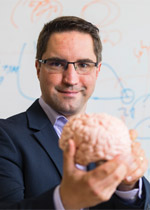 Prof. Dr. Simon Eickhoff is a visiting professor at the Chinese Academy of Science Institute of Automation. Working at the interface between neuroanatomy, data-science and brain medicine, he aims to obtain a more detailed characterization of the organization of the human brain and its inter-individual variability in order to better understand its changes in advanced age as well as neurological and psychiatric disorders. This goal is pursued by the development and application of novel analysis tools and approaches for large-scale, multi-modal analysis of brain structure, function and connectivity as well as by machine-learning for single subject prediction of cognitive and socio-affective traits and ultimately precision medicine.
Prof. Dr. Simon Eickhoff is a visiting professor at the Chinese Academy of Science Institute of Automation. Working at the interface between neuroanatomy, data-science and brain medicine, he aims to obtain a more detailed characterization of the organization of the human brain and its inter-individual variability in order to better understand its changes in advanced age as well as neurological and psychiatric disorders. This goal is pursued by the development and application of novel analysis tools and approaches for large-scale, multi-modal analysis of brain structure, function and connectivity as well as by machine-learning for single subject prediction of cognitive and socio-affective traits and ultimately precision medicine.
More information at: http://www.fz-juelich.de/inm/inm-7/EN/Home/home_node.html
Dr. Santosh Mehrotra
Professor of Economics, Centre for Labour,
Jawaharlal Nehru University, Delhi
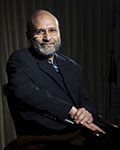 After an MA in Economics from New School for Social Research, New York, and Phd., Cambridge University (1985), Dr. Mehrotra was Associate Professor of Economics, JNU (1988-1991). He spent 15 years with the UN (1991-2006) in research positions, heading UNICEF’s global research programme at the Innocenti Research Centre, Florence, and as chief economist of the global Human Development Report New York. He returned to India to head the Rural Development Division and Development Policy Division of Planning Commission (2006-09), and was lead author of several chapters of the 11th & 12th Five Year Plans of India. He was also the Director General (2009-14) of the National Institute of Labour Economics Research, Planning Commission, in the rank of Secretary to the Government of India.
After an MA in Economics from New School for Social Research, New York, and Phd., Cambridge University (1985), Dr. Mehrotra was Associate Professor of Economics, JNU (1988-1991). He spent 15 years with the UN (1991-2006) in research positions, heading UNICEF’s global research programme at the Innocenti Research Centre, Florence, and as chief economist of the global Human Development Report New York. He returned to India to head the Rural Development Division and Development Policy Division of Planning Commission (2006-09), and was lead author of several chapters of the 11th & 12th Five Year Plans of India. He was also the Director General (2009-14) of the National Institute of Labour Economics Research, Planning Commission, in the rank of Secretary to the Government of India.
He consults regularly for the ADB, UNESCO, ILO in Asia region on skills and labour market issues. His work has been translated into Hindi, Spanish, French, Russian, German and Portuguese.
He has three books forthcoming, two of which are translations into Hindi. A new edited volume is called: Planning in the 20th Century and Beyond. India’s Planning Commission, NITI and the Future of Planning (Cambridge University Press).
His books also include:
Policies to Achieve Inclusive Growth in India Cambridge University Press, 2016
India’s Skills Challenge: OUP, 2014
India Human Development Report, 2011, Oxford University Press, Team Leader. (Team Leader)
Asian Informal Workers: Global Risks, Local Protection, Routledge, 2007
among others.
Dr. Tanja Carstensen
Sociologist and Postdoc Researcher
Department of Sociology, Ludwig-Maximilians-University Munich, Germany.
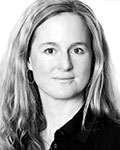 Dr. Carstensen received her doctoral degree in Sociology from the University of Hamburg and worked at University of Hohenheim, Hamburg University of Technology and Leuphana University of Lueneburg. Currently, she is the head of the project ‘Transformations of Gender Relations through Digitalization,’ funded by the Hans-Böckler-Foundation. Her research interests include: digitalization of work, gender relations in technology, social media at workplaces, digital culture, transformations of agency, and human-technology-interactions.
Dr. Carstensen received her doctoral degree in Sociology from the University of Hamburg and worked at University of Hohenheim, Hamburg University of Technology and Leuphana University of Lueneburg. Currently, she is the head of the project ‘Transformations of Gender Relations through Digitalization,’ funded by the Hans-Böckler-Foundation. Her research interests include: digitalization of work, gender relations in technology, social media at workplaces, digital culture, transformations of agency, and human-technology-interactions.
More information at: https://www.en.gender.soziologie.uni-muenchen.de/index.html
Dr. Maximilian Goethner
Postdoctoral Researcher, University of Jena, Germany
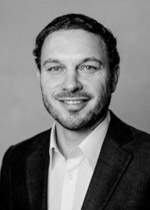 Dr. Maximilian Goethner is a research fellow at the DFG Graduate School “Economics of Innovative Change” (DFG-GRK 1411), funded by the German Research Foundation. He received his PhD in Economics from the University of Jena, Germany in 2012, studying determinants and effects of technology entrepreneurship. His research interests include digital innovation, labor mobility, and economic inequality. His current research focuses on determinants of the fear of automation as well as the diffusion of robot technology as driver of labor mobility.
Dr. Maximilian Goethner is a research fellow at the DFG Graduate School “Economics of Innovative Change” (DFG-GRK 1411), funded by the German Research Foundation. He received his PhD in Economics from the University of Jena, Germany in 2012, studying determinants and effects of technology entrepreneurship. His research interests include digital innovation, labor mobility, and economic inequality. His current research focuses on determinants of the fear of automation as well as the diffusion of robot technology as driver of labor mobility.
More information at: https://www.microtheory.uni-jena.de/
Professor Dr. rer. pol. Carsten Dreher
Professorship for Innovation Management, School of Business and Economics, Freie Universität Berlin
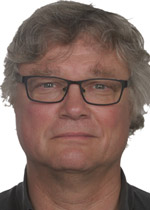 Since 2009, Prof. Dr. Carsten Dreher is at Freie Universität Berlin. He studied Industrial Engineering and Occupational Training at the Technical University of Karlsruhe. He started his career at the European Commission’s Directorate General Research as junior research fellow at the unit Forecasting and Assessment in Science and Technology (FAST). From 1989 to 2006 he worked at the Fraunhofer Institute for System and Innovation Research (ISI) in Karlsruhe analysing industrial innovation behaviour. After finishing his PhD in 1996 at TU Karlsruhe, being visiting scholar at MIT’s Industrial Performance Center, in 2006, he was appointed Joint Professor for Innovation Research and Innovation Management at the University of Flensburg and at the Mads Claussen Institute for Product Innovation of the University of Southern Denmark. His research interests are analysing technology dynamics, routines for innovation processes and mechanisms and impact of public innovation policies.
Since 2009, Prof. Dr. Carsten Dreher is at Freie Universität Berlin. He studied Industrial Engineering and Occupational Training at the Technical University of Karlsruhe. He started his career at the European Commission’s Directorate General Research as junior research fellow at the unit Forecasting and Assessment in Science and Technology (FAST). From 1989 to 2006 he worked at the Fraunhofer Institute for System and Innovation Research (ISI) in Karlsruhe analysing industrial innovation behaviour. After finishing his PhD in 1996 at TU Karlsruhe, being visiting scholar at MIT’s Industrial Performance Center, in 2006, he was appointed Joint Professor for Innovation Research and Innovation Management at the University of Flensburg and at the Mads Claussen Institute for Product Innovation of the University of Southern Denmark. His research interests are analysing technology dynamics, routines for innovation processes and mechanisms and impact of public innovation policies.
More information at: http://www.wiwiss.fu-berlin.de/en/fachbereich/bwl/management/index.html
Dr. Dev Nathan
Visiting Professor, Institute for Human Development, India
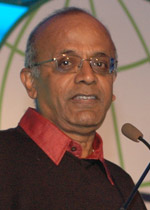 Dr. Dev Nathan is an economist and Visiting Research Fellow at the Duke University GVC Centre, USA. Some of his recent publications are (co-editor and author) Labour in Global Value Chains in Asia and Development with Global Value Chains: Upgrading and Innovation in Asia. He is one of the editors of the Cambridge University Press series on Development Trajectories in Global Value Chains.
Dr. Dev Nathan is an economist and Visiting Research Fellow at the Duke University GVC Centre, USA. Some of his recent publications are (co-editor and author) Labour in Global Value Chains in Asia and Development with Global Value Chains: Upgrading and Innovation in Asia. He is one of the editors of the Cambridge University Press series on Development Trajectories in Global Value Chains.
More information at: http://www.ihdindia.org/Dev_Nathan.html
Hubert Reilard
Managing Director Ret., EFD Induction Pvt Ltd
Past President, Indo-German Chamber of Commerce (IGCC)
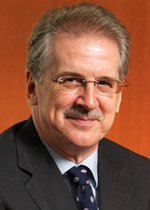 Mr. Hubert Reilard served as the Managing Director of EFD Induction Private Limited, Bangalore, India from 1995 to 2017. The company provides heating solutions for a wide range of industrial applications, with manufacturing plants, workshops and service centres across the world, in Europe, in the Americas and in Asia. He was also the President of the Indo-German Chamber of Commerce (IGCC) for the year 2015-2016. As former Managing Director with ALBA Computeranwendungen und Messtechnik GmbH in Munich, Germany, during 1989-1994, he was responsible for projects between the German Space Agency DLR and the Indian Space Rearch Organisation ISRO. Mr Reilard has also taught Physics at the University of Freiburg, Germany. He is a State certified Engineer for Electronics and Data Processing from the Technical College for Electro-technical and Electronic Engineering in Munich, Germany and holds a specialisation in microcontroller applications.
Mr. Hubert Reilard served as the Managing Director of EFD Induction Private Limited, Bangalore, India from 1995 to 2017. The company provides heating solutions for a wide range of industrial applications, with manufacturing plants, workshops and service centres across the world, in Europe, in the Americas and in Asia. He was also the President of the Indo-German Chamber of Commerce (IGCC) for the year 2015-2016. As former Managing Director with ALBA Computeranwendungen und Messtechnik GmbH in Munich, Germany, during 1989-1994, he was responsible for projects between the German Space Agency DLR and the Indian Space Rearch Organisation ISRO. Mr Reilard has also taught Physics at the University of Freiburg, Germany. He is a State certified Engineer for Electronics and Data Processing from the Technical College for Electro-technical and Electronic Engineering in Munich, Germany and holds a specialisation in microcontroller applications.
Programme
Please download the programme here: Programme Future Of Work 2019 [pdf, 68.02 KB]
Registration
Registrations for the symposium are now closed.
Related documents
Dr Didar Singh [pdf, 767.22 KB]
Dr. Thomas Lange [pdf, 727.00 KB]
Volker Schmid [pdf, 5.77 MB]
Prof. Dr. Simon Eickhoff [pdf, 1.24 MB]
Flyer Future of Work [pdf, 572.49 KB]
Event Report
Read the event report here.
